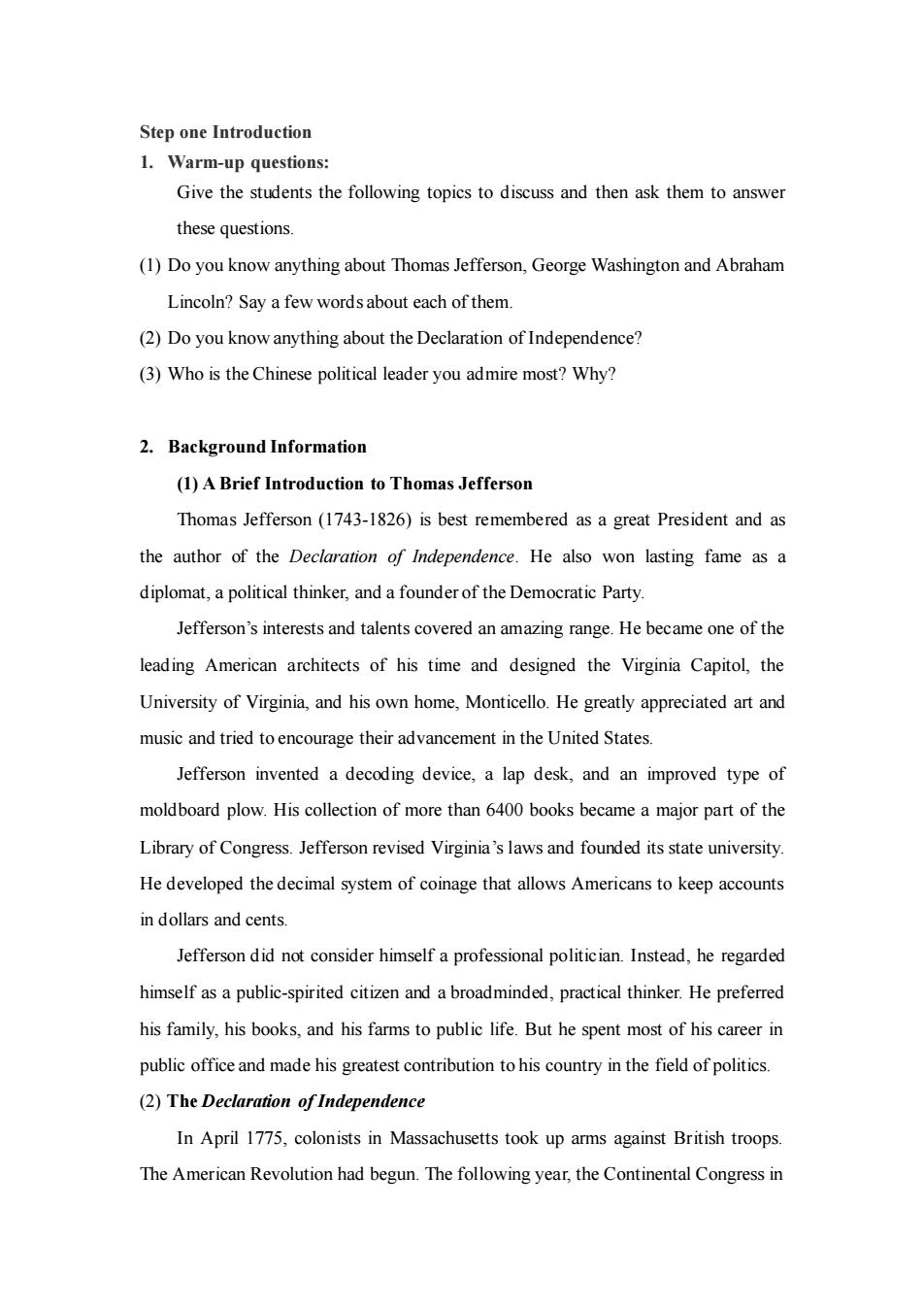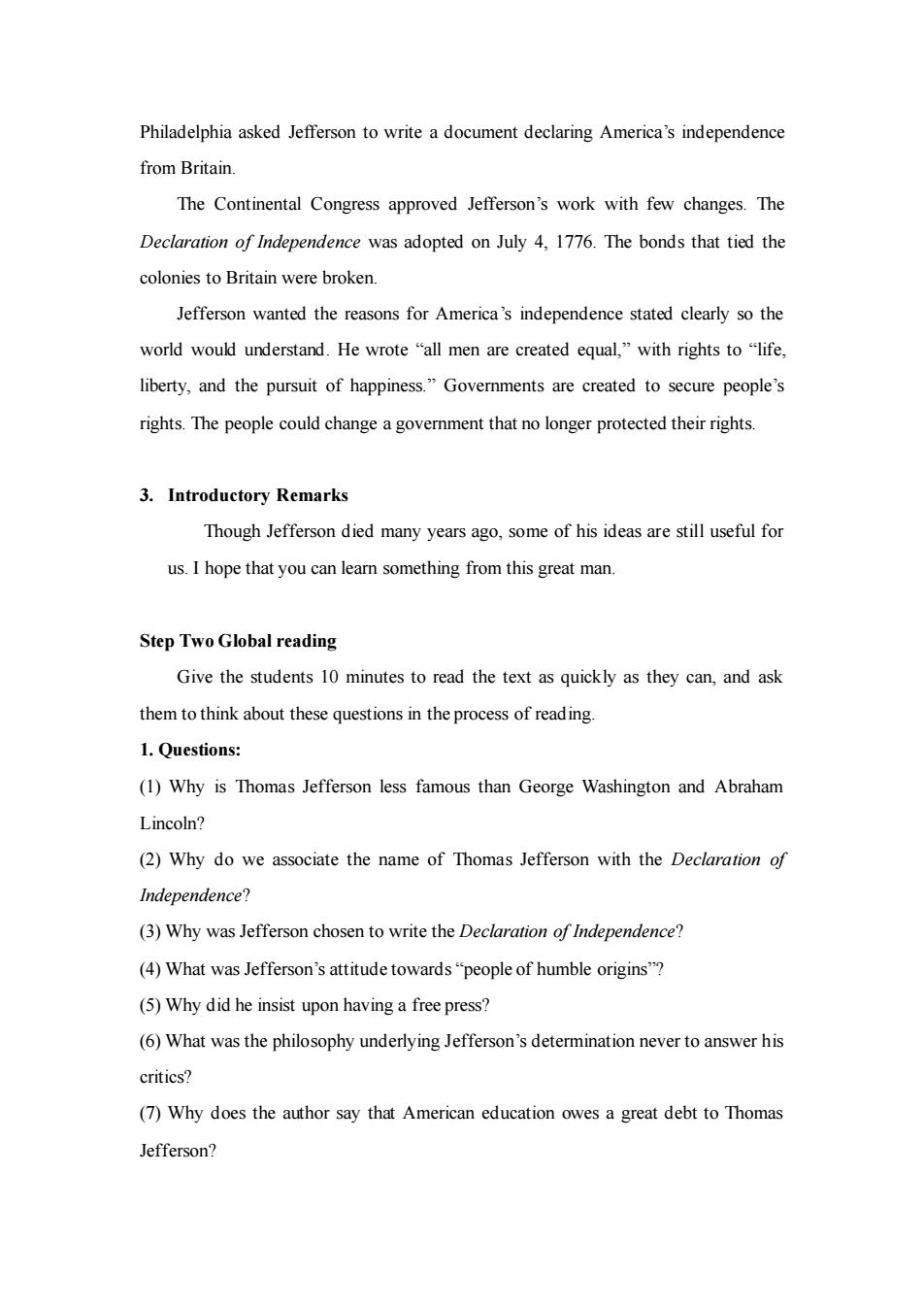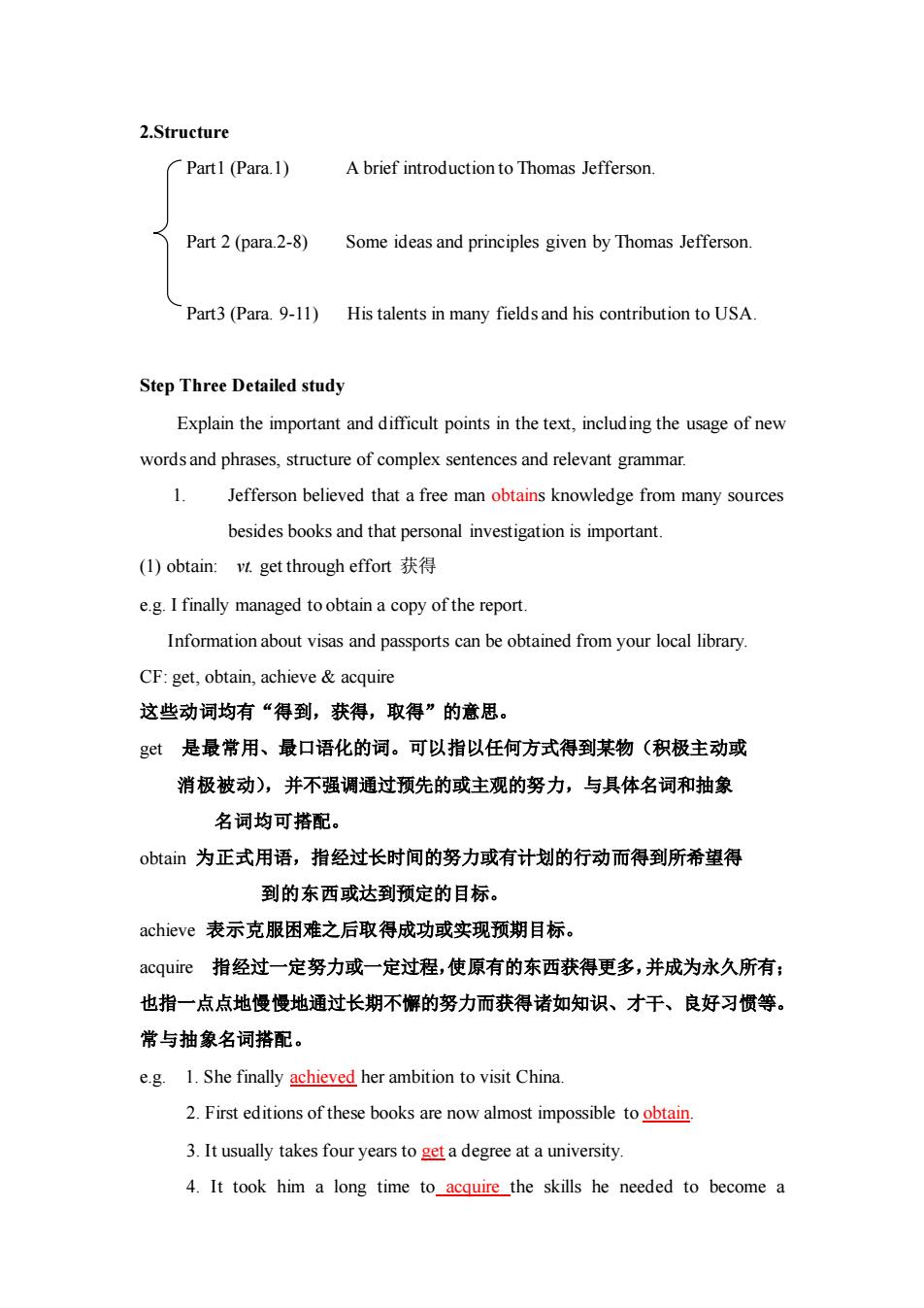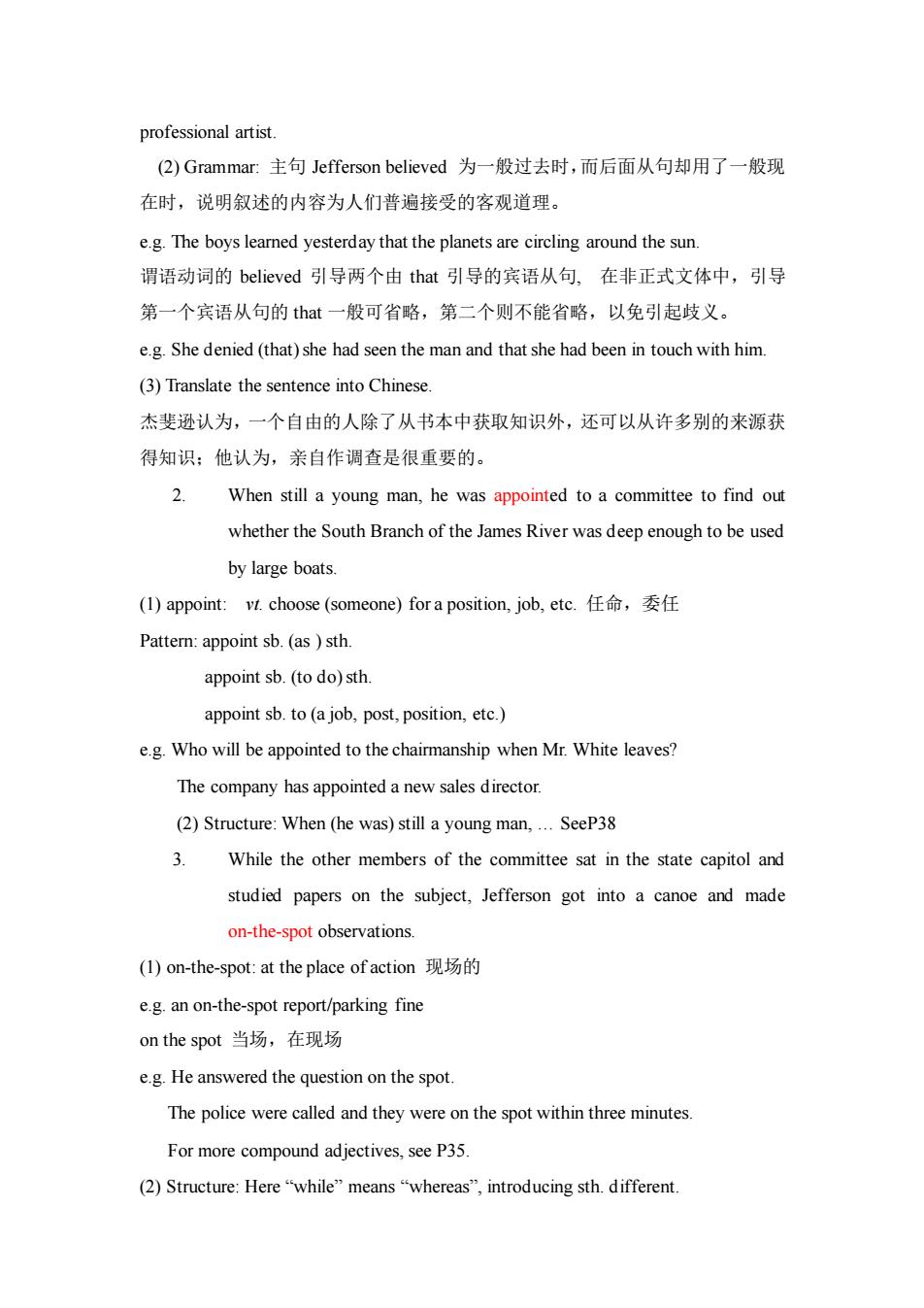
Unit 2 Lessons from Jefferson I.Teaching Aims 1.Enlarge the students'vocabulary by learning the new words and doing the vocabulary exercises. 2.Help the studentstoget the general ideaof the article. 3.Help the students leam from Jefferson. 4.Help the students to build up their language skills through more exercises on oral practice,phrases and expression,grammar,writing,etc. II.Key and Difficult Points 1.New Words and Phrases obtain,appoint,on-the-spot,by birth,humble,go out of one's to do,threaten. hesitate,conflict,act on,resent,be chained to sth.leave behind,superior,in existence above all,owe...to 2.Sentences (1)Jefferson believed that a free man obtains knowledge from many sources besides books and that personal investigation is important. (2)By birth and by education Jefferson belonged to the highest social class. (3)Yet,in a day when few noble persons ever spoke to those of humble origins except to give an order,Jefferson went out of his way to talk with gardeners. servants,and waiters. (4)Were it left to me to decide whether we should have a government without newspapers or newspapers without a government,I should not hesitate a moment to prefer the latter. (5)It is conflict and not unquestioning agreement that keeps freedom alive III.Teaching Methods Discussion,explanation,ask and answer IV.Time:4 periods V.Teaching Procedures:
Unit 2 Lessons from Jefferson I. Teaching Aims 1. Enlarge the students’ vocabulary by learning the new words and doing the vocabulary exercises. 2. Help the students to get the general idea of the article. 3. Help the students learn from Jefferson. 4. Help the students to build up their language skills through more exercises on oral practice, phrases and expression, grammar, writing, etc. II. Key and Difficult Points 1. New Words and Phrases obtain, appoint, on-the-spot, by birth, humble, go out of one’s to do, threaten, hesitate, conflict, act on, resent, be chained to sth., leave behind, superior, in existence, above all, owe…to 2. Sentences (1) Jefferson believed that a free man obtains knowledge from many sources besides books and that personal investigation is important. (2) By birth and by education Jefferson belonged to the highest social class. (3) Yet, in a day when few noble persons ever spoke to those of humble origins except to give an order, Jefferson went out of his way to talk with gardeners, servants, and waiters. (4) Were it left to me to decide whether we should have a government without newspapers or newspapers without a government, I should not hesitate a moment to prefer the latter. (5) It is conflict and not unquestioning agreement that keeps freedom alive. III. Teaching Methods Discussion, explanation, ask and answer IV. Time: 4 periods V. Teaching Procedures:

Step one Introduction 1.Warm-up questions: Give the students the following topics to discuss and then ask them to answer these questions (1)Do you know anything about Thomas Jefferson,George Washington and Abraham Lincoln?Say a few words about each of them. (2)Do you know anything about the Declaration of Independence? ()Who is the Chinese political leader you admire most?Why? 2.Background Information (1)A Brief Introduction to Thomas Jefferson Thomas Jefferson(1743-1826)is best remembered as a great President and as the author of the Declaration of Independence.He also won lasting fame as a diplomat,a political thinker,and a founder of the Democratic Party Jefferson's interests and talents covered an amazing range.He became one of the leading American architects of his time and designed the Virginia Capitol,the University of Virginia,and his own home,Monticello.He greatly appreciated art and music and tried toencourage their advancement in the United States Jefferson invented a decoding device,a lap desk,and an improved type of moldboard plow.His collection of more than 6400 books became a major part of the Library of Congress.Jefferson revised Virginia's laws and founded its state university He developed the decimal system of coinage that allows Americans to keep accounts in dollars and cents. Jefferson did not consider himself a professional politician.Instead,he regarded himself as a public-spirited citizen and a broadminded,practical thinker.He preferred his family,his books,and his farms to public life.But he spent most of his career in public office and made his greatest contribution to his country in the field of politics. (2)The Declaration of Independence In April 1775,colonists in Massachusetts took up arms against British troops. The American Revolution had begun.The following year,the Continental Congress in
Step one Introduction 1. Warm-up questions: Give the students the following topics to discuss and then ask them to answer these questions. (1) Do you know anything about Thomas Jefferson, George Washington and Abraham Lincoln? Say a few words about each of them. (2) Do you know anything about the Declaration of Independence? (3) Who is the Chinese political leader you admire most? Why? 2. Background Information (1) A Brief Introduction to Thomas Jefferson Thomas Jefferson (1743-1826) is best remembered as a great President and as the author of the Declaration of Independence. He also won lasting fame as a diplomat, a political thinker, and a founder of the Democratic Party. Jefferson’s interests and talents covered an amazing range. He became one of the leading American architects of his time and designed the Virginia Capitol, the University of Virginia, and his own home, Monticello. He greatly appreciated art and music and tried to encourage their advancement in the United States. Jefferson invented a decoding device, a lap desk, and an improved type of moldboard plow. His collection of more than 6400 books became a major part of the Library of Congress. Jefferson revised Virginia’s laws and founded its state university. He developed the decimal system of coinage that allows Americans to keep accounts in dollars and cents. Jefferson did not consider himself a professional politician. Instead, he regarded himself as a public-spirited citizen and a broadminded, practical thinker. He preferred his family, his books, and his farms to public life. But he spent most of his career in public office and made his greatest contribution to his country in the field of politics. (2) The Declaration of Independence In April 1775, colonists in Massachusetts took up arms against British troops. The American Revolution had begun. The following year, the Continental Congress in

Philadelphia asked Jefferson to write a document declaring America's independence from Britain. The Continental Congress approved Jefferson's work with few changes.The Declaration of Independence was adopted on July 4,1776.The bonds that tied the colonies to Britain were broken. Jefferson wanted the reasons for America's independence stated clearly so the world wouk understand.He wrote"all men are created equal,"with rights to"life liberty,and the pursuit of happiness."Govemments are created to secure people's rights.The people could change a government that no longer protected their rights. 3.Introductory Remarks Though Jefferson died many years ago,some of his ideas are still useful for us.I hope that you can learn something from this great man. Step Two Global reading Give the students 10 minutes to read the text as quickly as they can,and ask them to think about these questions in the process of reading. 1.Questions: (1)Why is Thomas Jefferson less famous than George Washington and Abraham Lincoln? (2)Why do we associate the name of Thomas Jefferson with the Declaration of Independence? ()Why was Jefferson chosen to write the Declaration of Independence? (4)What was Jefferson's attitude towards"people of humble origins"? (5)Why did he insist upon having a free press? (6)What was the philosophy underlying Jefferson's determination never to answer his critics? (7)Why does the author say that American education owes a great debt to Thomas Jefferson?
Philadelphia asked Jefferson to write a document declaring America’s independence from Britain. The Continental Congress approved Jefferson’s work with few changes. The Declaration of Independence was adopted on July 4, 1776. The bonds that tied the colonies to Britain were broken. Jefferson wanted the reasons for America’s independence stated clearly so the world would understand. He wrote “all men are created equal,” with rights to “life, liberty, and the pursuit of happiness.” Governments are created to secure people’s rights. The people could change a government that no longer protected their rights. 3. Introductory Remarks Though Jefferson died many years ago, some of his ideas are still useful for us. I hope that you can learn something from this great man. Step Two Global reading Give the students 10 minutes to read the text as quickly as they can, and ask them to think about these questions in the process of reading. 1. Questions: (1) Why is Thomas Jefferson less famous than George Washington and Abraham Lincoln? (2) Why do we associate the name of Thomas Jefferson with the Declaration of Independence? (3) Why was Jefferson chosen to write the Declaration of Independence? (4) What was Jefferson’s attitude towards “people of humble origins”? (5) Why did he insist upon having a free press? (6) What was the philosophy underlying Jefferson’s determination never to answer his critics? (7) Why does the author say that American education owes a great debt to Thomas Jefferson?

2.Structure Part1(Para.1) A brief introduction to Thomas Jefferson. Part 2(para.2-8) Some ideas and principles given by Thomas Jefferson Part3(Para.9-11)His talents in many fields and his contribution to USA Step Three Detailed study Explain the important and difficult points in the text,including the usage of new words and phrases,structure of complex sentences and relevant gramma 1.Jefferson believed that a free man obtains knowledge from many sources besides books and that personal investigation is important. (I)obtain:v以.get through effort获得 e.g.I finally managed to obtain a copy of the report. Information about visas and passports can be obtained from your local library. CF:get,obtain,achieve&acquire 这些动词均有“得到,获得,取得”的意思。 g是最常用、最口语化的词。可以指以任何方式得到某物(积极主动或 消极被动),并不强调通过预先的或主观的努力,与具体名词和抽象 名词均可搭配。 obtain为正式用语,指经过长时间的务力或有计划的行动而得到所希望得 到的东西或达到预定的目标。 achieve表示克服困难之后取得成功或实现预期目标。 acquire指经过一定努力或一定过程,使原有的东西获得更多,并成为永久所有: 也指一点点地慢慢地通过长期不懈的努力而获得诸如知识、才干、良好习惯等。 常与抽象名词搭配。 e.g.1.She finally achieved her ambition to visit China. 2.First editions of these books are now almost impossible to obtain 3.It usually takes four years to get a degree at a university. 4.It took him a long time to acquire the skills he needed to become a
2.Structure Part1 (Para.1) A brief introduction to Thomas Jefferson. Part 2 (para.2-8) Some ideas and principles given by Thomas Jefferson. Part3 (Para. 9-11) His talents in many fields and his contribution to USA. Step Three Detailed study Explain the important and difficult points in the text, including the usage of new words and phrases, structure of complex sentences and relevant grammar. 1. Jefferson believed that a free man obtains knowledge from many sources besides books and that personal investigation is important. (1) obtain: vt. get through effort 获得 e.g. I finally managed to obtain a copy of the report. Information about visas and passports can be obtained from your local library. CF: get, obtain, achieve & acquire 这些动词均有“得到,获得,取得”的意思。 get 是最常用、最口语化的词。可以指以任何方式得到某物(积极主动或 消极被动),并不强调通过预先的或主观的努力,与具体名词和抽象 名词均可搭配。 obtain 为正式用语,指经过长时间的努力或有计划的行动而得到所希望得 到的东西或达到预定的目标。 achieve 表示克服困难之后取得成功或实现预期目标。 acquire 指经过一定努力或一定过程,使原有的东西获得更多,并成为永久所有; 也指一点点地慢慢地通过长期不懈的努力而获得诸如知识、才干、良好习惯等。 常与抽象名词搭配。 e.g. 1. She finally achieved her ambition to visit China. 2. First editions of these books are now almost impossible to obtain. 3. It usually takes four years to get a degree at a university. 4. It took him a long time to acquire the skills he needed to become a

professional artist. (2)Grammar:主句Jefferson believed为一般过去时,而后面从句却用了一般现 在时,说明叙述的内容为人们普遍接受的客观道理。 e.g.The boys learned yesterday that the planets are circling around the sun. 谓语动词的believed引导两个由that引导的宾语从句,在非正式文体中,引导 第一个宾语从句的that一般可省略,第二个则不能省略,以免引起歧义。 e.g.She denied (that)she had seen the man and that she had been in touch with him (3)Translate the sentence into Chinese 杰斐逊认为,一个自由的人除了从书本中获取知识外,还可以从许多别的来源获 得知识:他认为,亲自作调查是很重要的。 2. When still a young man,he was appointed to a committee to find out whether the South Branch of the James River was deep enough to be used by large boats. ()appoint:v.choose(someone)fora position,job,ctc.任命,委任 Patter:appoint sb.(as)sth. appoint sb.(to do)sth. appoint sb.to(a job,post,position,ete.) e.g.Who will be appointed to the chairmanship when Mr.White leaves? The company has appointed a new sales director. (2)Structure:When (he was)still a young man,...SeeP38 3. While the other members of the committee sat in the state capitol and studied papers on the subject,Jefferson got into a canoe and made on-the-spot observations. (I)on-the-spot:at the place of action现场的 e.g.an on-the-spot report/parking fine on the spot当场,在现场 e.g.He answered the question on the spot. The police were called and they were on the spot within three minutes. For more compound adjectives,see P35. (2)Structure:Here“while”means“whereas'”,introducing sth..different
professional artist. (2) Grammar: 主句 Jefferson believed 为一般过去时,而后面从句却用了一般现 在时,说明叙述的内容为人们普遍接受的客观道理。 e.g. The boys learned yesterday that the planets are circling around the sun. 谓语动词的 believed 引导两个由 that 引导的宾语从句, 在非正式文体中,引导 第一个宾语从句的 that 一般可省略,第二个则不能省略,以免引起歧义。 e.g. She denied (that) she had seen the man and that she had been in touch with him. (3) Translate the sentence into Chinese. 杰斐逊认为,一个自由的人除了从书本中获取知识外,还可以从许多别的来源获 得知识;他认为,亲自作调查是很重要的。 2. When still a young man, he was appointed to a committee to find out whether the South Branch of the James River was deep enough to be used by large boats. (1) appoint: vt. choose (someone) for a position, job, etc. 任命,委任 Pattern: appoint sb. (as ) sth. appoint sb. (to do) sth. appoint sb. to (a job, post, position, etc.) e.g. Who will be appointed to the chairmanship when Mr. White leaves? The company has appointed a new sales director. (2) Structure: When (he was) still a young man, … SeeP38 3. While the other members of the committee sat in the state capitol and studied papers on the subject, Jefferson got into a canoe and made on-the-spot observations. (1) on-the-spot: at the place of action 现场的 e.g. an on-the-spot report/parking fine on the spot 当场,在现场 e.g. He answered the question on the spot. The police were called and they were on the spot within three minutes. For more compound adjectives, see P35. (2) Structure: Here “while” means “whereas”, introducing sth. different